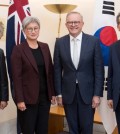- California Assembly OKs highest minimum wage in nation
- S. Korea unveils first graphic cigarette warnings
- US joins with South Korea, Japan in bid to deter North Korea
- LPGA golfer Chun In-gee finally back in action
- S. Korea won’t be top seed in final World Cup qualification round
- US men’s soccer misses 2nd straight Olympics
- US back on track in qualifying with 4-0 win over Guatemala
- High-intensity workout injuries spawn cottage industry
- CDC expands range of Zika mosquitoes into parts of Northeast
- Who knew? ‘The Walking Dead’ is helping families connect
Health minister rules out compromise on allocation of increased medical school seats
Health Minister Cho Kyoo-hong said Friday there is no room for compromise on the allocation of an additional 2,000 medical school admission seats, although the government has continued to seek talks with the medical community.
About 90 percent of 13,000 interns and resident doctors have remained off the job since Feb. 20 in protest of the plan to hike the number of medical students, forcing surgeries and other public health services to be canceled or delayed at major hospitals.
Despite the labor action by junior doctors, the government allocated the additional 2,000 admission seats to universities this week.
“It is beyond question,” Cho told an SBS radio when asked about the allocation of more admission seats.
Cho defended the allocation, saying it was not unilaterally done by the government, as universities have also wanted to increase medical admission seats.
To help universities cope with a rise in the number of medical students, the government will spend budget, Cho said.
“The number of national university professors will be increased by more than 1,000, and relevant ministries will consult to provide additional support if necessary,” Cho said.
While the government has shown little signs of backing down from the plan, Cho said the government has been seeking dialogue with the medical community via an “unofficial channel.”
Second Vice Health Minister Park Min-soo repeated an appeal for defiant trainee doctors to return to work as the ministry said it will begin suspending their licenses from next week.
“While the punishment for violations of the return-to-work order will start next week, the government will actively consider individuals who return or express their intention to return before the enforcement,” Park told reporters.
Park also suggested “unconditional” talks with medical professors as they vowed to reduce their weekly work hours to 52 hours starting next Monday.
“We are willing to engage in talks at any time and place. We urge the professors to cease exhausting arguments and join us at the negotiation table unconditionally,” Park added.
With the government taking final steps to suspend licenses of trainee doctors, the Korean Medical Association, a major lobby group of senior doctors, also vowed to dig in its heels.
“We refuse to acknowledge the current government as a legitimate regime,” the association said. “We are determined to continue fighting until a normal administration is established.”
Meanwhile, health authorities have designated 100 partner hospitals to transfer patients with mild symptoms from larger general hospitals, in order to address the ongoing medical shortage.
The health ministry plans to provide 90,000 won (US$67) to both institutions when a patient is transferred from one institution to another.
The government has been pushing to sharply raise the number of medical students to brace for the country’s fast-aging population, and a shortage of physicians in rural areas and essential areas, such as pediatrics and emergency departments.
Doctors, on the other hand, say the quota hikes will undermine the quality of medical education and result in higher medical costs for patients. They have called for measures to first address the underpaid specialists and improve legal protection against excessive medical malpractice lawsuits.











